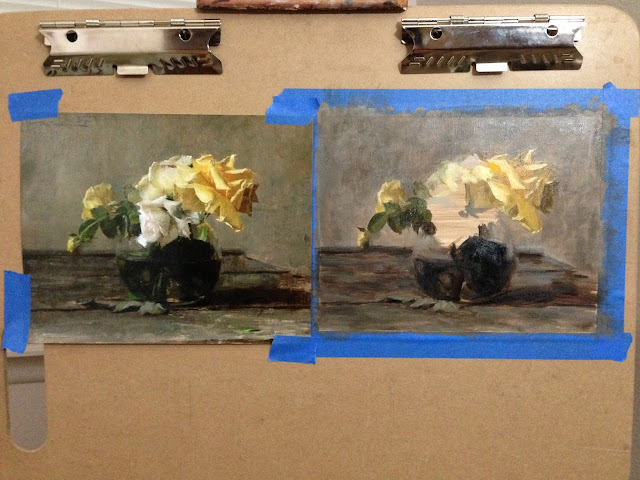Portrait of Ian
3-hour portrait from life of a new classmate. Profiles are tricky, and for some reason, drawing on toned paper is tricky too. There's something about all those speckles on the paper that makes it more difficult to see what's going on. Maybe it's something to get used to (I do like the overall look and feel of the toned paper), or maybe it's just something to forget about for a while (after I use up all 8 pieces I've got, of course--that was a $10 sheet of paper! ;). Or maybe I could try a little lighter wash. I dunno. I was watching a documentary about DaVinci the other day and they were talking about how he was always experimenting with new materials--and sometimes those experiments didn't turn out too well (how about that Last Supper? ;) And I could totally relate to that. I'm always wanting to try something new. Maybe when I find something I really love, that wanderlust will end, but I kind of doubt it, ha.
Speaking of DaVinci, I recently read a compilation of his thoughts on art, life, and science. It was interesting. I'd like to look into the history surrounding his time a little bit more, because I was a little confused by some of the things he was so passionately expounding upon--like why our sense of sight is the "noblest" sense (he repeatedly states that any sane person would choose to lose the senses of hearing, touch, and taste long before giving up sight, ha). Pages and pages of this. And why painting is the highest art form (he seemed to have a particular beef with poetry and its obvious inferiority to painting). Maybe at that time poetry was considered art, while painting was still a craftsman-type trade or something? I'm an ardent lover of poetry, so don't tell me one is better than the other ;)
Anyway, I especially enjoyed his thoughts about painting. He encourages copying from master copies to a point, but emphasizes getting out and working from nature if you want to really learn to paint. I'm sure this was especially true in his time when a lot of painting was done by convention and based more on the perceived form of things rather than how they really look. In these days, I'm sure you could copy master paintings forever and never run out of paintings that pushed the limits of capturing an accurate illusion of light. But like they say at the atelier, you want to own the information. And I don't think you really own the information you gain from master copies until you can turn around and implement that knowledge while working from life.
Here are some quotes from the collection:
(from the intro) The genius of Leonardo as a painter came through unfolding the mystery of life [...] he had gazed with wonder at the beauty of the world. "look at the grace and sweetness of men and women in the street," he wrote. The most ordinary functions of life and nature amazed him most.
"It is impossible to either hate or to love a thing without first acquiring knowledge of it."
"It is ordained that to the ambitious, who derive no satisfaction from the gifts of life and the beauty of the world, life shall be a cause of suffering, and they shall possess neither the profit nor the beauty of the world."
"Just as food eaten without appetite is a tedious nourishment, so does study without zeal damage the memory by not assimilating what it absorbs."
"As a well spent day affords happy sleep, so does a life profitably employed afford a happy death."
"He who offends others is not himself secure."
"Reprove your friend in secret and praise him in public."
"The painter's work will be of little merit if he takes the painting of others as his standard, but if he studies from nature he will produce good fruits [...] They who merely study the masters and not the works of nature are the grandchildren, and not the children, of nature."
"We can safely say that those people are under a delusion who call that painter a good master who can only draw well a head or a figure. Certainly there is no great merit if, after studying a single thing during a whole lifetime, you attain to a certain degree of perfection in it. But knowing, as we do, that painting includes and comprehends all the works produced by nature, or brought about by the fortuitous action of man, and in fact everything that the eye can see, he seems to me to be a poor master who can only do one thing well."
"He is a poor disciple who does not surpass his master."
"We are well aware that faults are more easily recognized in the works of others than in our own, and often in blaming the small faults of others thou wilt ignore great ones in thyself."
And I'll end with one of my favorites--I 100% agree with this:
"Certainly while a man is painting he should not be loth to hear every opinion: since we know well that a man, although he be not a painter, is cognizant of the forms of another man, and will be able to judge them, whether he is hump-backed or has a shoulder too high or too low, or whether he has a large mouth or nose, or other defects. And if we know that men are capable of giving a correct judgement on the works of nature, much more ought we to acknowledge their competence to judge our faults, since we know how greatly a man may be deceived in his own work; and if thou art not conscious of this in thyself, study it in others and thou wilt profit by their faults. Therefore be desirous to bear with patience the opinions of others."




Comments
Post a Comment